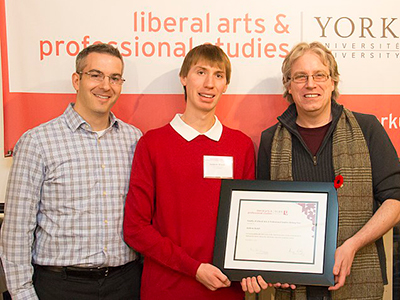This fall, we’re celebrating the 10th anniversary of the Wikipedia Student Program with a series of blog posts telling the story of the program in the United States and Canada.
Jonathan Obar was teaching at Michigan State University ten years ago when he heard some representatives from the Wikimedia Foundation would be visiting. As the governance of social media was central to Jonathan’s research and teaching, he looked forward to the meeting.
“To be honest, I was highly critical of Wikipedia at the time, assuming incorrectly that Wikipedia was mainly a problematic information resource with few benefits beyond convenience,” he admits. “How my perspective changed during that meeting and in the months that followed. I was taught convincingly the distinction between Wikipedia as a tool for research, and Wikipedia as a tool for teaching. Clearly much of the controversy has always been, and remains, about the former. More to the moment, was the realization about the possibilities of the latter. Banning Wikipedia is counter-productive if teaching about the internet is the plan. The benefits of active, experiential learning via Web 2.0 are as convincing now as they were then.”
Jonathan should know: He joined the pilot program of what’s now known as the Wikipedia Student Program, and ten years later, he’s still actively teaching with Wikipedia. Jonathan incorporated Wikipedia assignments into his classes at Michigan State, the University of Toronto, the University of Ontario Institute of Technology, and now at York University, where he’s been since 2016. Not only has Jonathan taught with Wikipedia himself, he also spearheaded efforts to expand the program within Canada.
“The opportunity to work with Wikimedia and now Wiki Education continues to be one of the more meaningful academic experiences I’ve been fortunate enough to encounter these last ten years,” he says. “I’ve connected more than 15 Communication Studies courses to the Education Program, and in each course I’ve worked with students eager to learn about Wikipedia, happy when they learn how to edit, and thrilled when their work contributes to the global internet. As a Canadian recruiter for the Education Program I had the privilege to work with more than 35 different classes operating across Canada, meeting and learning with different instructors, while also sharing a fascination with Wikipedia.”
As an early instructor in the program, Jonathan experienced the evolution of our support resources, from the original patchwork wiki pages to the now seamless Dashboard platform with built-in training modules. He notes he appreciates the ways it’s become easier to teach with Wikipedia in the 10 years he’s been doing it. He notes that training he received as an early instructor in the program a decade ago talked about source triangulation; now, the information literacy environment online requires these skills more than ever.
“Students consistently emphasize how Wikipedia assignments help them develop information and digital literacies, which they view as essential to developing their knowledge of the internet,” Jonathan says. “The students are correct as learning about Wikipedia and its social network helps to address many disinformation and misinformation challenges.”

In 10 years, many moments stand out for Jonathan, particularly in the support he’s received and interactions he’s had with Wikipedia’s volunteer community. But he points to one student’s work as being a particular favorite: A York University student in his senior undergraduate seminar created the article on the “Digital Divide in Canada”, including passing through the “Did You Know” process to land on Wikipedia’s main page. York University also recognized the student’s work, giving him the senior undergraduate writing prize, over more than 20,000 other students across 20 departments and programs in the Faculty.
“The recognition by the university emphasizes not only that the community is starting to acknowledge the value of Wikipedia, but perhaps also that the student’s work, supported by the program, helped inform that perspective,” he says.
Jonathan is teaching two more classes this year as part of our program, one on Fake News, Fact-Finding, and the Future of Journalism and one on Information and Technology.
“After attending that meeting all those years ago, I was convinced that Wikipedia was one of the most effective tools for eLearning available (and it remains that way),” he says. “I hope to continue teaching with Wikipedia, and with the Wikipedia Student Program, for many years to come.”
Hero image credit: Alin (Public Policy), CC BY-SA 3.0, via Wikimedia Commons; In-text image credit: Jon Sufrin, on behalf of Faculty of LA&PS, York University, CC BY-SA 4.0, via Wikimedia Commons
